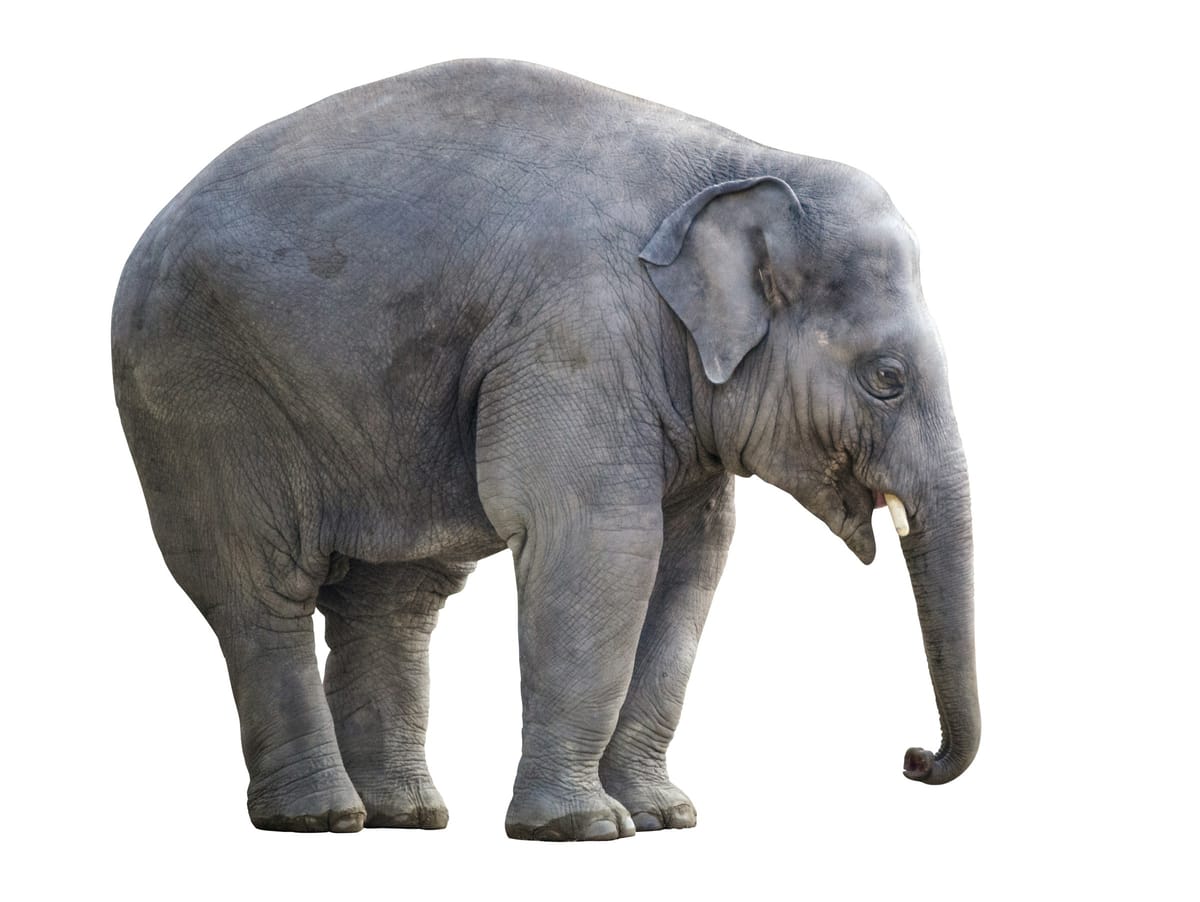Confronting the Elephant

A lot of people "in da biz," myself included, are only now beginning to reckon with the damage the past decade has wreaked on our psyches. We've faced upheaval after upheaval, each of which was a blow to some of the fundamental assumptions that were the pillars supporting design as a field. These assumptions are now proving to be misconceptions.
Assumption 1: Tech's business model is based in addressing user needs.
Tech companies have made major pivots in directions fundamentally hostile to user-centered design. The blockchain. The metaverse. NFTs. AI-ify everything. Where users asked for the same thing they've always wanted – software that simply worked well and efficiently – companies under capitalism's manic insistence on continual rapid growth have veered into one niche technology after another in the hopes that they could force users into generating more profit for them.
Each time one of these pivots happened, bright-eyed design practitioners who believed they were serving to better the world by creating usable software became that much more disillusioned. Each time, we were required to shelve everything we were taught about the right way to design in order to just ship the damn thing.
And tech companies are still wringing enough money out of their customers, even with their products' shitty user experiences, that they don't see a need to focus on usability anymore.
Assumption 2: Our skillset is valued, if not always understood.
I've never worked in a non-agency environment where I felt that leadership actually understood what UX was. For a long time, I thought that was because I mostly worked with bigger, older, enterprise Midwestern companies rather than newer Silicon Valley ones. But watching the layoffs roll in over the past few years and reading all the idiotic posts about how GenAI can "do most of what a designer does" has made it clear that the lack of understanding is universal.
Earlier in my career, it mostly took the form of leadership assuming we were the ones who "made it pretty," while we spent most of our time aligning stakeholders, making sense of the information architecture, and scraping together whatever user research we could manage with barely any funding, before THEN making it pretty. The hope was that all the legwork we put in to do the actual work of design would become apparent because we made a bunch of artifacts and showed them to our partners in engineering and product and QA, who understood how helpful they were, and we did this over and over and over.
But apparently that didn't work out. These days, it's more or less the same as it was in 2015, except we're no longer as seen as valuable for our ability to slap that coat of paint on the work at the end because GenAI can do that moderately well, or at least okay enough that an executive with very little taste can approve it.
Assumption 3: Demand for design talent will only ever grow.
In a world constantly increasing in complexity, where digital systems continue to proliferate, it seems like it should follow that there must always be more designers. Unfortunately, that's predicated on the previous two assumptions being true. Yes, new software is being shipped every day, but more and more of it is either coasting on mimicking "proven" UI templates and interaction patterns, or it's operating with total disregard for user experience.
And as I first called out years ago, tons of tech companies drastically over-hired for design, creating the illusion that everyone who got a design degree could easily make bank working for a FAANG company. Now that a huge chunk of those designers have been laid off, the industry is saturated with experienced people with highfalutin resumes all competing for the same few open roles, leaving even fewer opportunities for the continued waves of new designers coming out of schools and bootcamps, all of whom were promised never-ending job opportunities when they enrolled.
Assumption 4: Tech companies make rational decisions based on data.
You forgot the number one rule of human psychology: humans are not rational decisionmakers. And, unfortunately, companies are run by humans.
So no, you don't get to work remotely even though it has no negative impact on productivity and drastically improves a company's access to talent.
No, you don't get autonomy over your work despite the fact that high-trust, autonomous teams are shown to outperform others.
No, you don't get a seat at the table even though design-led companies are more successful.
No, you don't get to opt out of using LLMs for work even though AI adoption has not shown any kind of consistent ROI.
We are beholden to the fundamental irrationality, vanity, and insecurity of the people who lead our organizations, no matter how rational they believe themselves to be.
The Fallout
With all those shaky pillars now fully exposed, our field is in a state of extreme precariousness. A lot of experienced folks are bailing, either jumping ship to the (IMO equally precarious) world of product management or leaving tech altogether. For those who stay, the future is very murky.
Right-wing extremism is running rampant, the world is on fire, capitalist corporate cynicism is at an all-time high, and more and more of the decisions that affect our work lives are being made by MBAs who believe in growth at all costs. It's likely not worth the toll on your soul to continue to fight for the user within this structure. The only ethical choice is to chart your own path outside of the industry. But goddamn, is that hard. Are enough of us really cut out to be entrepreneurs or freelancers? Are there enough ethical private companies or nonprofits out there for those that aren't to make a living wage? Should we all just accept a life of moonlighting?
For my part, I feel like I've spent the past five years stepping way back from work and focusing on things I feel I can actually control. I've renovated my house. Gotten a dog. Revamped my diet. Lost weight. Gardened. Got into alt-cycling. Read The Power Broker. Swapped jobs a few times and significantly increased my income.
But I've also stopped thinking and writing about design. I've stopped trying to push boundaries and improve processes at work. Instead, I mostly just try to do what's expected of me well. And it feels...boring. Empty. For better or worse, work is a huge part of my life, of all our lives. It used to feel exciting and validating and challenging. I used to get emotional during usability testing of my work. I used to get to usability test my work.
I don't know if there's a way back to that feeling, whether it's something that can come from within or some kind of external change I need to make. I have to hope there is. In the meantime, I'm challenging myself to start writing here more. Some is probably going to be long and serious, but a lot will probably be short and stupid. Life is also short and stupid. We need to find ways to make it fun to live.




